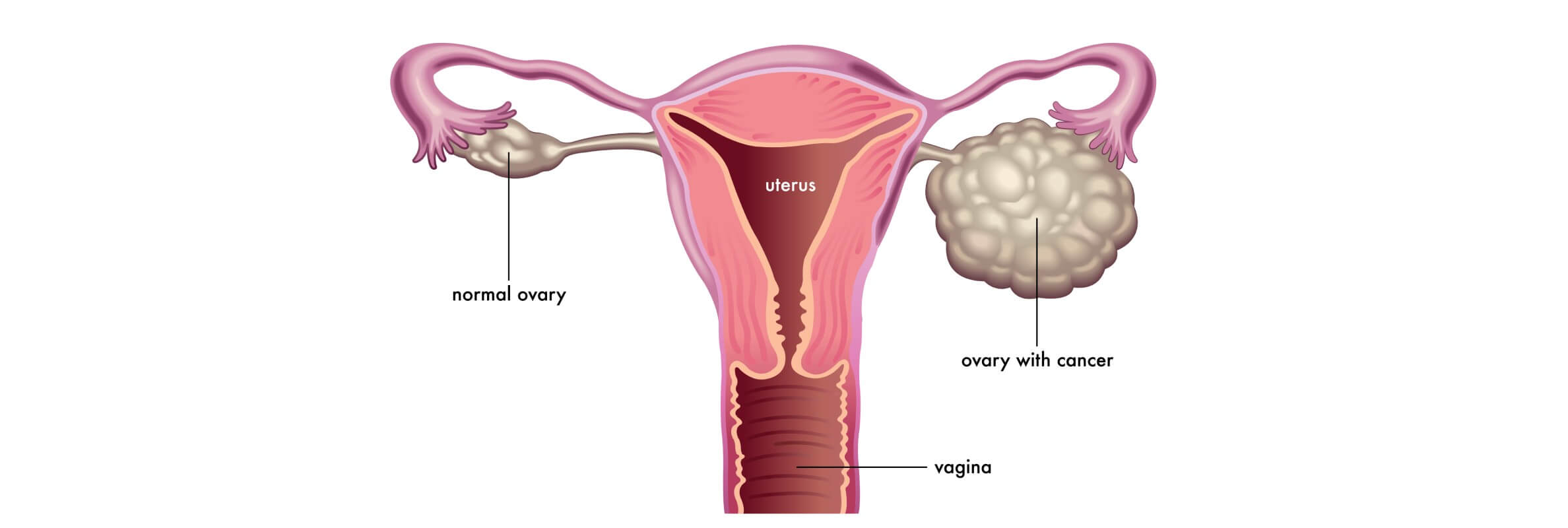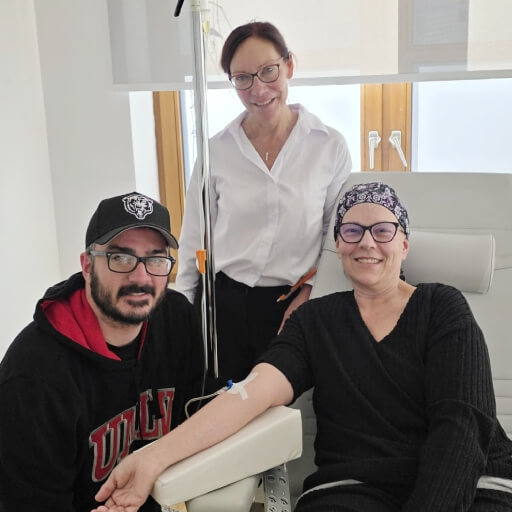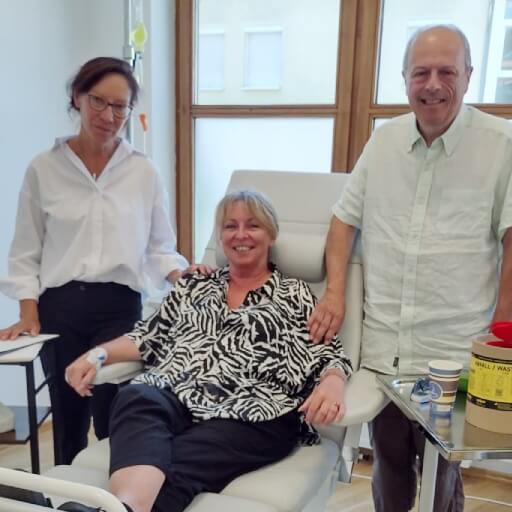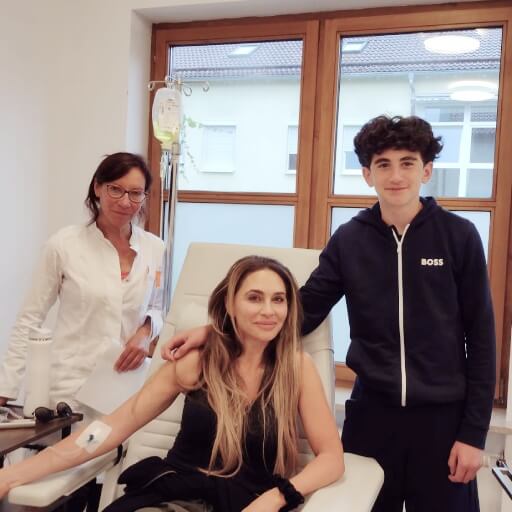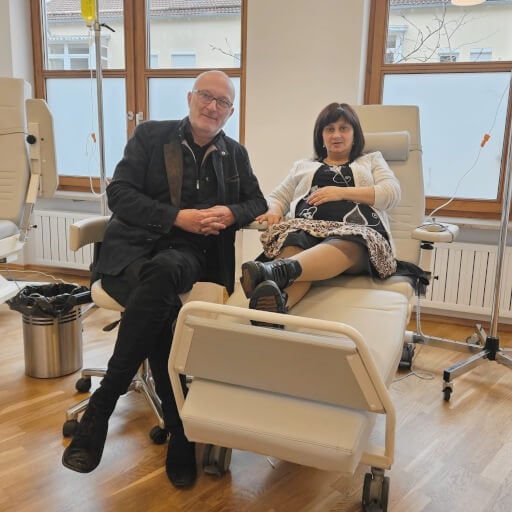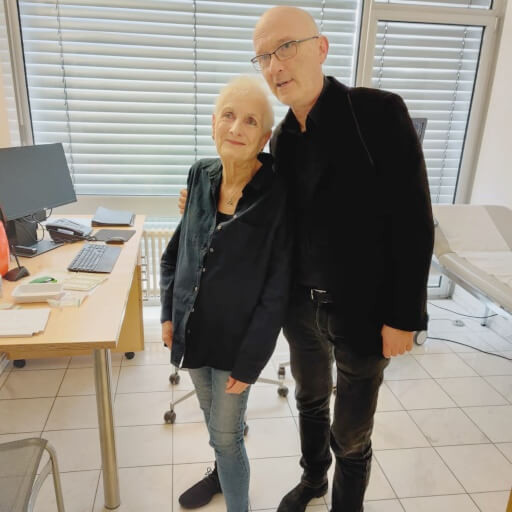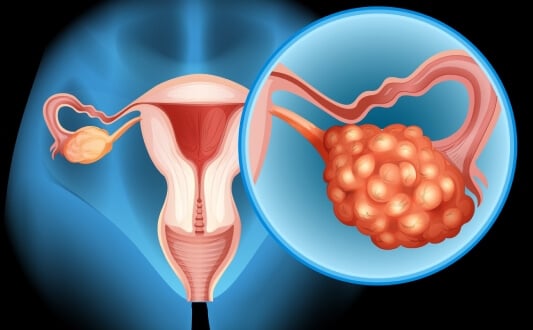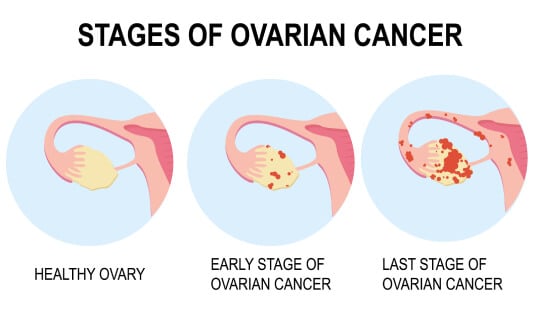Ovarian cancer remains one of the most challenging malignancies in gynecologic oncology. Often diagnosed at an advanced stage, it is the fifth leading cause of cancer-related death among women in the Western world. According to the American Cancer Society, over 20,000 new cases of ovarian cancer will be diagnosed in the United States in 2024, with more than 12,000 women expected to die from the disease [1]. The five-year survival rate remains below 50%, primarily due to late detection and high recurrence rates following standard treatments such as surgery and chemotherapy.
In this context, innovative ovarian cancer treatment is no longer optional – it is essential. Among the most promising developments is dendritic cell (DC) vaccination, a form of personalized immunotherapy that uses the body’s own immune system to recognize and fight ovarian cancer.
What is Ovarian Cancer?
Ovarian cancer is a malignant tumor that develops in the ovaries – the small, almond-shaped organs located on either side of the uterus, responsible for producing eggs and female hormones. Although it is not the most common gynecologic cancer, it causes more deaths than any other cancer of the female reproductive system. The disease often grows silently, and by the time symptoms appear, it is usually in an advanced stage.
Stages of Ovarian Cancer
Like many cancers, ovarian cancer is classified into four stages:
- Stage I is limited to one or both ovaries.
- Stage II involves spread to the pelvic region.
- Stage III includes metastasis to the abdominal lining or lymph nodes.
- Stage IV, the most advanced, indicates distant metastasis, such as to the liver or lungs.
Early-stage disease can often be treated successfully with surgery and chemotherapy, but unfortunately, fewer than 20% of cases are diagnosed at this point.
Challenges in Ovarian Cancer Diagnosis
One of the most difficult aspects of ovarian cancer is its subtle onset. Early symptoms – such as bloating, pelvic discomfort, or changes in urination – are often vague and mistaken for benign conditions. There is currently no reliable screening test for ovarian cancer in asymptomatic women, and CA-125 blood levels, while useful, are not specific enough to serve as a standalone diagnostic tool.
Prognosis in Advanced Ovarian Cancer
By the time ovarian cancer is diagnosed, more than 70% of patients are already in stage III or IV. At these stages, the five-year survival rate drops significantly – sometimes to as low as 30%, depending on tumor spread and treatment response [2]. While standard therapies such as surgery and chemotherapy may initially reduce tumor burden, relapse is frequent and often more resistant to conventional drugs. This has led leading cancer centers to adopt more personalized approaches – such as dendritic cell vaccines – that aim to enhance the immune system’s ability to recognize and control residual or recurrent disease.
Conventional Treatments for Ovarian Cancer
Standard treatment for ovarian cancer typically involves a combination of surgery and systemic therapy. While these approaches have helped extend survival in many cases, they also come with notable limitations – especially when the disease returns or proves resistant to drugs. Understanding the strengths and weaknesses of conventional options is key to appreciating the role of more individualized therapies like dendritic cell vaccines for ovarian cancer.
Surgery as The First Line of Defense in Ovarian Cancer
Surgical removal of the tumor – known as debulking or cytoreductive surgery – is often the first major step in treating ovarian cancer. The goal is to remove as much visible cancer as possible. Women who undergo successful debulking tend to have better outcomes, especially when minimal disease is left behind. However, complete removal isn't always possible, particularly in advanced cases where the cancer has spread throughout the abdomen.
Chemotherapy for Ovarian Cancer
After surgery, as the first step, most women receive chemotherapy – typically a combination of drugs that can shrink tumors and delay progression, especially early in the treatment course. But chemotherapy’s effectiveness often declines with time. Many tumors become resistant, and side effects such as fatigue, nausea, neuropathy, and immune suppression can make treatment more difficult with each recurrence.
Targeted Therapies for Ovarian Cancer: Precision With Limits
In recent years, targeted therapies like PARP inhibitors have been introduced, especially for women with BRCA1/2 mutations or homologous recombination deficiency (HRD). These drugs can help delay progression in certain subtypes of ovarian cancer, but they are not universally effective and are often used in combination with other treatments. Moreover, resistance to targeted agents is also a growing concern.
The Limitations of Conventional Approaches for Ovarian Cancer
Despite advances in surgery and chemotherapy, recurrence remains a major challenge. Standard treatments often fail to eliminate microscopic disease that can later grow and spread. Repeated courses of chemotherapy may offer diminishing returns and negatively impact overall well-being. These limitations are driving greater interest in modern immunotherapies – like dendritic cell vaccines – which aim to stimulate the body’s own immune system to detect and control cancer cells more precisely and durably [3].
Understanding Dendritic Cell Vaccines for Ovarian Cancer
The immune system is remarkably good at recognizing what doesn’t belong in the body. Every day, it scans for viruses, bacteria, and mutated cells – and in many cases, it catches problems before they become serious. But cancer often finds ways to slip through the cracks, hiding from immune surveillance or actively suppressing it. This is where dendritic cell (DC) vaccines come in – offering a way to reawaken the immune system and direct its attention where it’s needed most.
Dendritic cells are sometimes called the "sentinels" of the immune system. Their job is to detect danger, pick up pieces of abnormal material – like cancer antigens – and present that information to T-cells, which are the immune system’s attack force. Without dendritic cells, the immune system can’t respond in a targeted way. They act as the bridge between detection and action.
Ralph Steinman was awarded the Nobel Prize in Physiology or Medicine in 2011 for his groundbreaking discovery of dendritic cells and for revealing how these cells play a crucial role in activating the immune system to recognize and fight diseases effectively [4].
How Dendritic Cell Vaccines Work in Ovarian Cancer
In immunotherapy, scientists take advantage of this natural function. The process usually begins by collecting a patient’s own immune cells – typically through a simple blood draw. In the lab, dendritic cells are isolated and "trained" by exposing them to tumor-specific antigens. Once these cells have been properly loaded, they are reintroduced into the patient’s body, where they act like messengers – activating T-cells to recognize and attack cancer cells.
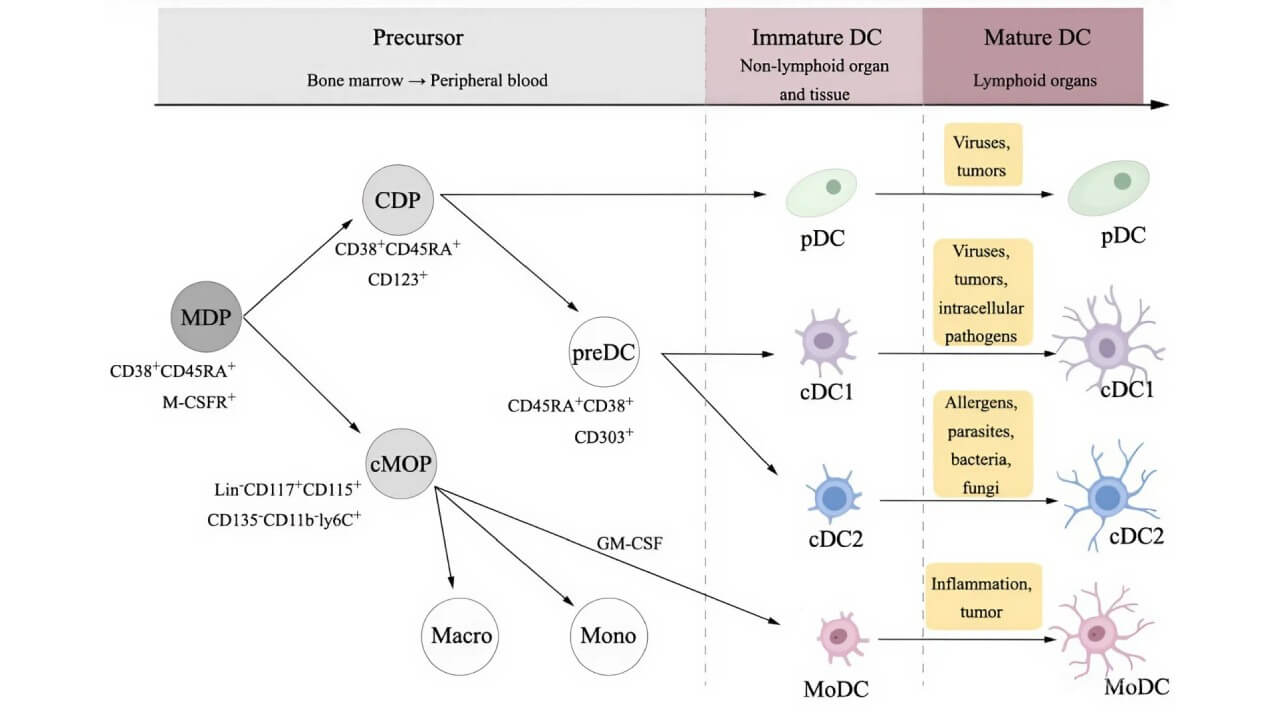
This approach is highly personalized, since the vaccine is made using the patient’s own cells and tumor material. It's also a strategic form of therapy for advanced ovarian cancer: instead of killing cancer directly, it empowers the immune system to do so more intelligently and precisely. Over the past two decades, dendritic cell therapy for cancer has been explored in various cancers – including melanoma, prostate cancer, glioblastoma, and others - showing increasing evidence of safety and immune system activation.
What Makes DC Therapy Different from Other Ovarian Cancer Immunotherapies?
Unlike checkpoint inhibitors that simply release the brakes on T cells already in action, or CAR T-cell therapy that modifies T cells directly, dendritic cell therapy for cancer works a step earlier. It rebuilds the conversation between the innate and adaptive parts of the immune system, helping the body spot tumors it might have missed before.
What’s really cool about this therapy is how personal it is. The dendritic cells are "taught" using antigens taken from the patient’s own tumor, so the immune system learns exactly what to attack. This means fewer side effects and a better chance that the immune system will remember and keep fighting the cancer over time.
Dendritic cells also don’t just send messages from afar – they actually get inside the tumor itself. Detailed imaging shows that mature dendritic cells can move into the tumor, make contact with cancer cells, and help shape the local immune response to support the fight against the tumor.
Application in Ovarian Cancer
Dendritic cell therapy for ovarian cancer has become a proven and integral part of modern treatment, especially in cases where conventional therapies alone are insufficient. Their unique ability to harness and direct the patient’s immune system allows for precise targeting of tumor cells, improving disease control and reducing the risk of recurrence.
Effective Use Across Ovarian Cancer Stages
Dendritic cell vaccines in ovarian cancer have proven to be most effective when administered during specific phases of treatment, particularly after initial debulking surgery and chemotherapy. This timing is crucial because it coincides with a period of minimal residual disease – when the bulk of the tumor has been removed or reduced, and only small numbers of cancer cells remain. At this stage, the patient’s immune system is in an optimal state to be activated and trained to recognize any leftover cancer cells, thereby significantly reducing the risk of relapse.
The combination of surgery, chemotherapy, and dendritic cell vaccination creates a powerful multi-pronged approach. Surgery physically removes as much tumor mass as possible, while chemotherapy targets rapidly dividing cells to further reduce tumor burden. Following these, dendritic cell vaccines for ovarian cancer step in to stimulate a tailored immune response, effectively "teaching" the body’s defenses to seek out and destroy any cancer cells that survive standard treatments.
Importantly, dendritic cell vaccination is not limited to early or intermediate disease phases. Clinical evidence shows that even in advanced or recurrent cases – where traditional therapies often fail to induce durable remission – this advanced immunotherapy for ovarian cancer offers meaningful benefits. By re-engaging the immune system, dendritic cell vaccines provide a new line of attack against tumors that have developed resistance to chemotherapy or other treatments.
Through careful coordination with other therapeutic phases, dendritic cell vaccination enhances overall treatment effectiveness and improves outcomes for patients facing the challenges of ovarian cancer across various stages.
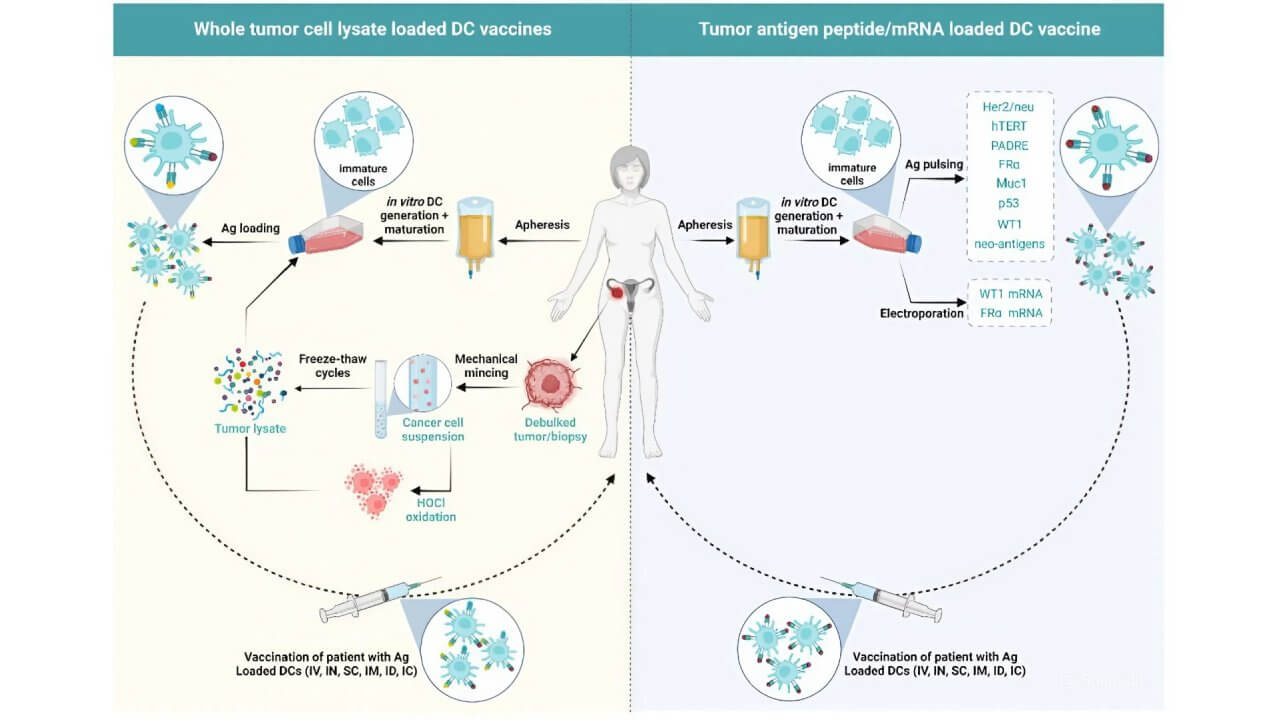
Integration With Standard Treatments for Ovarian Cancer
Dendritic cell vaccination represents a powerful addition to the arsenal of advanced immunotherapy for ovarian cancer. Rather than replacing conventional methods, it works hand-in-hand with established treatments to create a more effective and comprehensive strategy. In particular, after chemotherapy – a common step in late-stage ovarian cancer treatment – dendritic cell vaccines play a critical role in helping the immune system identify and eliminate residual tumor cells.
Chemotherapy’s ability to reduce tumor burden not only shrinks the cancer but also exposes tumor antigens that might otherwise remain hidden from immune detection. This creates an ideal environment for the dendritic vaccine to prime the immune system, essentially "teaching" immune cells to recognize these tumor-specific markers. As a result, patients with advanced ovarian cancer receive a boost in their immune response targeted specifically at ovarian cancer cells, increasing the chance of durable remission.
When combined with surgery and systemic therapies, dendritic cell vaccination strengthens the overall late-stage ovarian cancer treatment effect. Surgery removes the bulk of the tumor, systemic therapies aim to control disease spread, and the dendritic vaccine mobilizes the body’s immune defenses to seek out and destroy remaining cancer cells. This layered approach not only improves patient outcomes but also reduces the likelihood of relapse by engaging the immune system in a sustained fight against the disease.
For patients facing late-stage ovarian cancer, this combination offers renewed hope. Dendritic cell vaccine provides a personalized, immune-driven method that complements traditional treatments, transforming the way ovarian cancer is managed today. As a result, cancer patients benefit from an integrated treatment plan that harnesses the full power of their own immune system to control and suppress their cancer.
Clinical Evidence and Outcomes
Numerous clinical trials and real-world applications have confirmed that dendritic cell vaccines improve progression-free survival and overall survival rates in ovarian cancer patients. Their personalized nature minimizes side effects common to chemotherapy and supports long-term immune memory, reducing the likelihood of disease recurrence. This method is rapidly becoming a standard recommendation in specialized cancer centers worldwide.
| Characteristic | Standard Methods | Dendritic Cell Therapy |
|---|---|---|
| 2-Year Survival Rate | ~25–35% for relapsed/refractory cases | Up to 60% in select patients |
| Response Rate | Less than 10–20% durable responses in advanced disease | 45–65% documented T-cell activation and immune control |
| Side Effects | Severe systemic toxicity (nausea, fatigue, neutropenia, infections) | Mostly mild (local redness, fever, fatigue for 24–48h) |
Why Choose Germany for Dendritic Cell Therapy for Ovarian Cancer?
Germany has established itself as a global leader in personalized cancer immunotherapy abroad, offering innovative ovarian cancer treatment options that combine advanced technology with expert clinical care. For cancer patients considering dendritic cell therapy, Germany provides an unmatched environment – balancing innovation, quality, and accessibility – to ensure the best possible outcome.
World-Class Medical Facilities and Expertise
Hospitals in Germany are known for their high standards and comprehensive cancer care programs. When it comes to ovarian cancer immunotherapy, Germany stands out thanks to specialized centers that integrate dendritic cell vaccines into multidisciplinary treatment plans. These German hospitals employ experienced oncologists, immunologists, and radiologists who collaborate closely to tailor treatments for each patient’s unique case.
Choosing innovative ovarian cancer treatment in Germany means accessing state-of-the-art diagnostic tools that allow for precise tumor profiling and immune system assessment. This level of detailed diagnosis is essential for creating truly personalized cancer immunotherapy abroad, ensuring that dendritic cell vaccines are designed and administered with maximum effectiveness.
| Cost of treatment | Standard Methods | Dendritic Cell-Based Therapy |
|---|---|---|
| Price of Treatment in Germany | $25,000 – $280,000 for a full course | $20,000 – $38,000 for a full course |
| Price of Treatment in the UK | $26,000 – $320,000 for a full course | Not available |
| Price of Treatment in the USA | $100,000 – $350,000 for a full course | Limited availability, estimated $100,000 – $150,000 |
A Proven Track Record in Cancer Vaccine Therapy
The development and application of a cancer vaccine in Germany is backed by robust clinical research and numerous successful patient outcomes. Patients traveling for personalized cancer immunotherapy abroad choose German hospitals because of their commitment to innovation and their patient-centered approach.
Whether you are seeking initial treatment or advanced care for ovarian cancer, Germany’s integrated healthcare system offers access to dendritic cell vaccines combined with surgery, chemotherapy, and other immunotherapies. This comprehensive approach optimizes the effectiveness of your treatment plan and supports long-term health.
Why Germany Stands Out for Ovarian Cancer Immunotherapy
The combination of cutting-edge science, experienced medical teams, and advanced infrastructure makes hospitals in Germany a preferred destination for advanced immunotherapy for ovarian cancer. With personalized cancer immunotherapy abroad growing in demand, Germany offers a trusted environment where patients can receive individualized care tailored to their specific cancer profile.
Choosing innovative ovarian cancer treatment in Germany not only provides access to the latest dendritic cell therapies but also ensures you are supported throughout your journey, from initial diagnosis to post-treatment follow-up.
A Medical Journey: Every Step of the Way With Booking Health
Finding the best treatment strategy for your clinical situation is a challenging task. Being already exhausted from multiple treatment sessions, having consulted numerous specialists, and having tried various therapeutic interventions, you may be lost in all the information given by the doctors. In such a situation, it is easy to choose a first-hand option or to follow standardized therapeutic protocols with a long list of adverse effects instead of selecting highly specialized innovative treatment options.
To make an informed choice and get a personalized cancer management plan, which will be tailored to your specific clinical situation, consult medical experts at Booking Health. Being at the forefront of offering the latest medical innovations for already 12 years, Booking Health possesses solid expertise in creating complex cancer management programs in each individual case. As a reputable company, Booking Health offers personalized ovarian cancer treatment plans with direct clinic booking and full support at every stage, from organizational processes to assistance during treatment. We provide:
- Assessment and analysis of medical reports
- Development of the medical care program
- Selection of a suitable treatment location
- Preparation of medical documents and forwarding to a suitable clinic
- Preparatory consultations with clinicians for the development of medical care programs
- Expert advice during the hospital stay
- Follow-up care after the patient returns to their native country after completing the medical care program
- Taking care of formalities as part of the preparation for the medical care program
- Coordination and organization of the patient's stay in a foreign country
- Assistance with visas and tickets
- A personal coordinator and interpreter with 24/7 support
- Transparent budgeting with no hidden costs
Health is an invaluable aspect of our lives. Delegating management of something so fragile yet precious should be done only to experts with proven experience and a reputation. Booking Health is a trustworthy partner who assists you on the way of pursuing stronger health and a better quality of life. Contact our medical consultant to learn more about the possibilities of personalized treatment with innovative methods for ovarian cancer with leading specialists in this field.
Dendritic Cell Innovation: Cancer Treatment with Booking Health
Frequently Asked Questions About Dendritic Cell-Based Immunotherapy In Ovarian Cancer
Send request for treatmentA dendritic cell vaccine is a personalized immunotherapy that uses the patient’s own dendritic cells to stimulate immune activation. These cells train the immune system to recognize and attack cancer cells by presenting tumor-specific antigens, enhancing precise tumor targeting.
Dendritic cell therapy activates the immune system by using cancer vaccines created from a patient’s cells. It boosts the immune response to ovarian tumors, helping the body recognize and destroy cancer cells more effectively, especially in advanced or metastatic stages.
Yes. Even in stage 4 or metastatic ovarian cancer, dendritic cells can enhance immune activation and improve tumor targeting. Combined with other treatments, this personalized immunotherapy supports better disease control and can extend survival.
Dendritic cell vaccines are generally well tolerated. Side effects are usually mild and may include low-grade fever or fatigue. Because they harness the patient’s own immune system, these cancer vaccines cause fewer adverse reactions than traditional chemotherapy.
Patients with ovarian cancer at various stages, including those with advanced or metastatic disease, are eligible. Personalized immunotherapy is tailored for each patient’s unique cancer characteristics.
Yes. Combination therapy with chemotherapy and dendritic cell vaccines is common. Chemotherapy reduces tumor burden and exposes antigens, allowing dendritic cells to better activate the immune response for improved cancer control.
Germany’s advanced medical centers offer state-of-the-art diagnostics and treatment in dendritic cell vaccines. Personalized immunotherapy in German hospitals is supported by expert teams, ensuring high-quality care and innovative approaches to cancer treatment.
Booking Health support makes it easy to access dendritic cell therapy in Germany. The Booking Health team assists with choosing the right clinic, organizing medical documents, and scheduling your treatment. With Booking Health, international patients receive end-to-end support for a smooth and personalized experience.
Clinical data show that the two-year survival rate for patients with recurrent or refractory ovarian cancer after dendritic cell therapy is 60% compared to 25–35% with standard treatment. This represents a doubling of the chances of a long, progression-free life.
Dendritic cell therapy provides immune activation of T cells with a response rate of 45–65% compared to less than 20% with standard methods. This proves that the vaccine effectively triggers an antitumor immune response even in advanced or chemotherapy-resistant processes.
Yes, these are the patients who benefit the most. The therapy is able to activate the immune system even after numerous courses of chemotherapy, when the tumor becomes insensitive to drugs. Thanks to this it is possible to achieve long-term remission or stabilization of the disease.
Unlike chemotherapy which is toxic to the body, dendritic cell vaccine stimulates natural immunity to fight the tumor. It is created from the patient's own cells which provides a personalized approach and minimal side effects without damaging healthy tissues.
Unlike severe systemic complications after chemotherapy (nausea, anemia, infections), dendritic cell vaccine usually causes only mild reactions: redness of the skin, short-term fatigue or fever for 24–48 hours. The treatment is easily tolerated.
Because it activates the body's own immune system to fight tumor cells, improves survival, reduces relapses and has virtually no toxic effects. This method allows you to treat even complex forms of cancer when standard therapy no longer gives the expected result.
In Germany ovarian cancer patients receive dendritic cell therapy only after careful evaluation. Treatments are individualized and administered under close supervision. Also they are combined with standard oncology care to enhance immune response.
Choose treatment abroad and you will for sure get the best results!
Authors:
This article was edited by medical experts, board-certified doctors Dr. Nadezhda Ivanisova, and Dr. Bohdan Mykhalniuk. For the treatment of the conditions referred to in the article, you must consult a doctor; the information in the article is not intended for self-medication!
Our editorial policy, which details our commitment to accuracy and transparency, is available here. Click this link to review our policies.
Sources:
[1] American Cancer Society. Key Statistics for Ovarian Cancer. https://www.cancer.org/cancer/types/ovarian-cancer/key-statistics.html
[2] National Cancer Institute. Cancer Stat Facts: Ovarian Cancer. https://seer.cancer.gov/statfacts/html/ovary.html
[3] Journal for ImmunoTherapy of Cancer (JITC). Safety and efficacy of dendritic cell-based immunotherapy DCVAC/OvCa added to first-line chemotherapy (carboplatin plus paclitaxel) for epithelial ovarian cancer: a phase 2, open-label, multicenter, randomized trial. https://jitc.bmj.com/content/10/1/e003190
[4] Nobel Prize. The Nobel Prize in Physiology or Medicine 2011 – Ralph Steinman.. https://www.nobelprize.org/prizes/medicine/2011/steinman/facts/
[5] Xi Zhang, Tianhui He, Yuan Li, Ling Chen, Hongyu Liu, Yu Wu, Hongyan Guo. Dendritic Cell Vaccines in Ovarian Cancer. Front Immunol. 2021 Jan 25:11:613773. doi: 10.3389/fimmu.2020.613773. eCollection 2020. [DOI] [PubMed]
[6] Aarushi Audhut Caro, Sofie Deschoemaeker, Lize Allonsius, An Coosemans, Damya Laoui. Dendritic Cell Vaccines: A Promising Approach in the Fight against Ovarian Cancer. Cancers (Basel) . 2022 Aug 21;14(16):4037. doi: 10.3390/cancers14164037. [DOI] [PubMed]
Read:
Dendritic cell therapy in cancer treatment in Germany - Vaccination against cancer
Article menu:
- What is Ovarian Cancer?
- Conventional Treatments for Ovarian Cancer
- Understanding Dendritic Cell Vaccines for Ovarian Cancer
- Application in Ovarian Cancer
- Why Choose Germany for Dendritic Cell Therapy for Ovarian Cancer?
- A Medical Journey: Every Step of the Way With Booking Health
- Frequently Asked Questions About Dendritic Cell-Based Immunotherapy In Ovarian Cancer
Don't know where to start?
Contact Booking Health